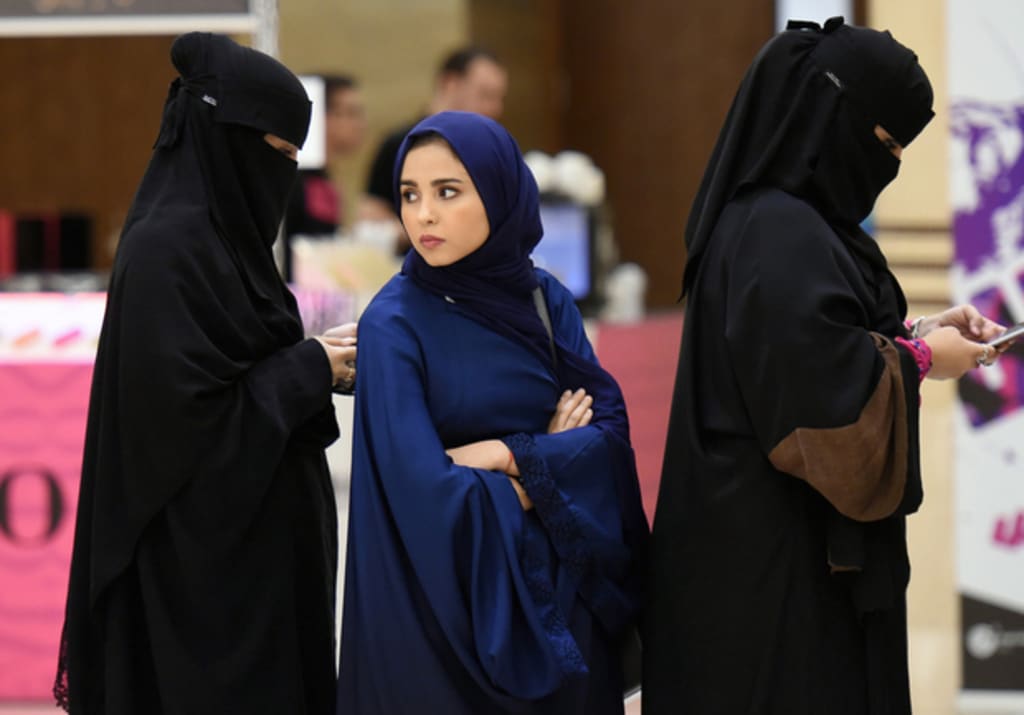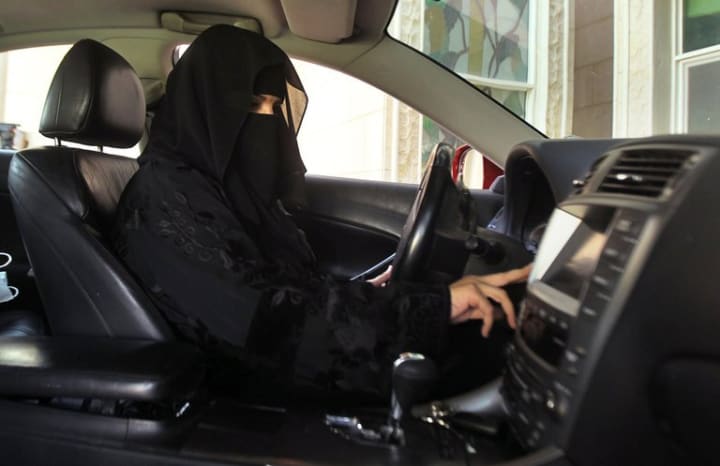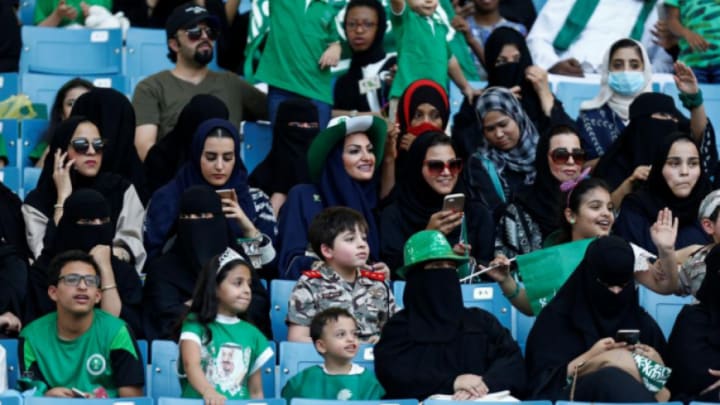Femaleconomics and Politics in the Middle East
Alternative Approaches to Understanding the Past and Present Placement of Women in MENA Societies

The role of women in the Middle East has long been a talking point among politicians, activists, men, and, of course, women in the West. Women's inability to drive in Saudi Arabia coupled with astronomically high female unemployment across the region due to political and social restrictions has been met with ire from countries that delve inward and question why the situation has not radically changed in the 21st century. Many hurry to crucify Islam for the sins of the Middle East and oftentimes gloss over socio-political variables that shaped the landscape of the region throughout history.
First, what must never be eclipsed when approaching social issues in the Middle East and North Africa (henceforth, MENA) is the detrimental impact of oil. Underlining oil as a reason for the restricted rights of women does seem like a stretch, but many studies suggest a correlation. The acclaimed economist Michael Ross (2008) states that in South Korea, women attained suffrage by entering the manufacturing sector during wartime when male labour was scarce. Bringing home a paycheck granted women domestic leverage and the ability to have a voice in where, how, and when finances would be spent. This newfound clout spilled outside the household in the form of women's unions and feminist movements that weighted their economic contributions as bargaining chips to procure equal political rights. For South Korea, and for most other countries during industrialization or wartime, the manufacturing sector stood as a stepping stone for equality. Now turning the attention back to the MENA, its pattern of development is entirely unique and different from the rest of the world. Just thirty years ago, Dubai was a fishing village. That is, until oil catapulted the region into serendipitous growth.
Oil profits force currencies to rapidly appreciate, a reality that wrecks havoc on any country's manufacturing sector, as it cannot compete with currencies that are much weaker selling the exact same economic unit. To put it into perspective, if you could buy an I-Phone X for 1000 US dollars or the same I-Phone X for 1000 Canadian dollars, which one will you likely choose? A Google search will tell you that 1,000 Canadian dollars is roughly 800 USD. The winner of the transaction should be quite clear. As a result, the MENA's manufacturing sector slowly crumbled against competition until all that was left was oil: the fracking, drilling, processing, and exportation of it.
With no manufacturing sector within which women could leverage any economic clout for equality, the situation for them remained underdeveloped, neglected, and over time, was incorporated into an understanding of justhow things are. In cases such as these, leaders and societies were forced to address and explain why the reality was as such, and Islam was employed as the easy, ribbon-tied explanation. While the rest of the world witnessed Vigdís Finnbogadóttir ascend to power and later become the longest serving female political executive, Saudi Arabia and its Gulf partners were requiring women to have written letters of permission from their male superiors to simply travel somewhere (in a vehicle which they were prohibited from operating, at that).

Excluding women from economics and society also yielded potential for self-preservation for various regimes across the region. When 50 percent of the population is denied access to political and social participation, it is much more challenging for the remaining 50 percent (essentially, the men) to work through differences as a monolith to incite real change or effective coup d'etats. During the Arab Spring, male protesters in Bahrain formed human barriers to prevent women from including themselves in any sort of popular uprising. Yet in the North African states (Egypt, Libya, Tunisia) where women had comparatively more freedom to work and the proclivity toward social participation, the overture of leadership was indeed successful. The regimes of the Gulf perhaps have genuine fears about the risk of elevating women to a point of socio-political parity with men, and have thus shied away from or even outright suppressed any vocal support for change.
These two points underlining why women's rights are so different in the MENA compared to the Western world, East Asia and even Africa are alternative variables to consider when granting due process to Islam. That is not to say that religions do not play any role in shaping social landscapes; of course they do, but they are not the sole factors at work. Socio-economics, issues of development, and political institutions or lack thereof can often provide more quantifiable and concrete answers to modern challenges and realities. But what these two points fail to explain is why we have witnessed recent strides in the area of women's equality in Saudi Arabia. Women can suddenly drive, attend sports stadiums, and vote in municipal elections.
While this question is considerably Saudi-specific, it can be answered quite simply with one word: oil. The Saudis are painfully aware of oil's exhaustive quality. They look at neighboring Kuwait, a country rapidly chomping through its natural resources, and call for family roundtables to establish Vision 2030, that is, the Saudi plan to wean off of oil and onto renewable energy sources. For years, such a plan was deemed far too risky to the regime, as oil (along with Wahabism) was largely preserving the anciens leaders; yet the Saudis learned quickly that as much as oil safeguarded the regime, when its market prices depress, it conversely exposes political limitations and weaknesses. It is quite possible that the House of Saud has now positioned itself as the champion of renewable energy in an effort to appear more modern. The regime understands that it can seldom walk a tightrope of economic and environmental progressivism alongside social traditionalism with any true measure of success. It just cannot work that way. So in order to save its economy, the country requires modern technologies related to sustainable energy; and the creation of these technologies necessitates free thought and innovation. With free thought and innovation comes social activism and liberalism. The regime knows this, so it grants incremental decrees of equality to women before they have a chance to ask for it. This way, the House of Saud is the hero. It ushers in renewable energy and paves the way for the rest of the Gulf, while it also adorns women with newfound privileges to drive on roads and to attend soccer games. There is little doubt that the regime has masterfully worked to win over its female population to deter it from wanting to form civil unions or to catalyze or contribute to popular dissent.

That being said, a win is a win. Saudi women now have the opportunity to better integrate into society at unprecedented capacities. This edge toward liberalism on the peninsula should send ripples of female equality across the rest of the MENA, as Saudi Arabia is often heralded by other Gulf countries as the almighty protector from Shia influence and provider of natural or emergency resources and moral purity. It is therefore no surprise that courts in the UAE have had to address the case of three women who sought to legally change their genders; or that 75 percent of Kuwaiti workers report their workplace to be evenly mixed between men and women*. The landscape for women in the MENA is reshaping by no coincidence as quickly as oil and gas reserves dwindle. And while any liberalization on issues of gender should be welcomed in the MENA, it would showcase more power and wider movements of the Overton Window if women were permitted to have direct agency in these policy reforms that pertain to them. It is a start; and as free thought inevitably flows through the boundaries of the Kingdom and other Gulf states, we can only hope that women in the MENA become further empowered by their own, home-made version of feminism that is molded completely by their own hands and sculpted purely by their own unique experiences.
So instead of overemphasizing how women are oppressed by Islam, Sharia Law, or the Quran, dig a little deeper. Consider the social implications of rapid industrialization due to oil discovery and the conflict between equal gender participation and regime preservation. Also understand that female equality in the MENA is a hot-spot of shattered glass ceilings and discoveries upon which we may only speculate the future implications. And while the situation for women terraforms the social landscape, it is pivotal to keep in mind that the changes are ever more breath-taking when championed by women themselves.
About the Creator
Darragh Joyce
• 24 | Irish | Los Angeles | The District •
overthoughts






Comments
There are no comments for this story
Be the first to respond and start the conversation.